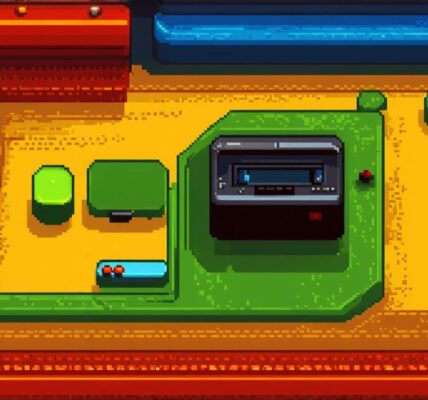<div>
<h2>I. Introduction</h2>
<p>If you're a video game developer, you know the importance of having an online presence that showcases your work and connects with your audience. In today's digital age, having a blog is a must-have tool in any video game developer's arsenal.</p>
</div>
<div>
<h2>A. Importance of Video Game Blogs</h2>
<p>In recent years, video game blogs have become an essential tool for video game developers to showcase their work and connect with their audience. They provide a platform for developers to share their thoughts and opinions on the latest gaming trends and developments, as well as to promote their games and connect with other like-minded individuals in the industry.</p>
</div>
<div>
<h2>B. Benefits of Starting a Video Game Blog</h2>
<ul>
<li><p>Increased visibility: A blog can help you reach a wider audience by improving your search engine rankings and attracting more traffic to your website.</p></li>
<li><p>Improved engagement: By regularly posting engaging content, you can foster a sense of community among your readers and encourage them to interact with your blog and games.</p></li>
<li><p>Establishing expertise: A well-written and informative blog can help establish you as an authority in the video game industry and build trust with potential customers.</p></li>
</ul>
</div>
<div>
<h2>C. Target Audience</h2>
<p><em>Video game developers who want to start a blog typically fall into one of two categories:</em></p>
<ul>
<li><p>Independent Developers: These are developers who create games on their own or work for small studios and want to promote their work to a wider audience.</p></li>
<li><p>Large Studios: Larger video game studios often have multiple teams working on different projects, and they use blogs to keep fans updated on the latest news and developments.</p></li>
</ul>
</div>
<div>
<h2>II. Choosing Your Niche</h2>
</div>
<div>
<h3>A. What is a Niche?</h3>
<p>A niche refers to a specific area of interest within a broader industry.</p>
</div>
<div>
<h3>B. How to Choose Your Niche</h3>
</div>
<div>
<ol>
<li><p>Consider Your Passion: Your blog should be about something you are passionate about and knowledgeable in. This will help you write engaging content that resonates with your audience.</p></li>
<li><p>Identify a Gap in the Market: Look for areas where there is a lack of information or expertise in the industry. This will help you stand out from the competition and attract a loyal following.</p></li>
<li><p>Consider Your Audience: Consider the age, interests, and needs of your target audience when choosing a niche. This will help you create content that is relevant and valuable to your readers.</p></li>
</ol>
</div>
<div>
<h2>III. Creating Your Content Plan</h2>
</div>
<div>
<h3>A. Types of Blog Posts</h3>
</div>
<div>
<ol>
<li><p>News and Reviews: Write about the latest video game releases, including news updates, reviews, and analysis.</p></li>
<li><p>How-to Guides: Write guides that teach readers how to do something related to video games, such as modding or cheating.</p></li>
<li><p>Opinion Pieces: Write opinion pieces that offer your insights on current gaming trends and developments.</p></li>
<li><p>Interviews: Conduct interviews with game developers, influencers, and other industry professionals to gain valuable insights and share with your audience.</p></li>
<li><p>Retrospectives: Write retrospectives about classic games, including their history, impact, and influence on modern gaming.</p></li>
</ol>
</div>
<div>
<h3>B. Posting Schedule</h3>
<p>Determine a posting schedule that works for you and your audience. Ideally, you should aim to post at least once per week, but it's important to find a balance that works for you and your readers.</p>
</div>
<div>

C. Building a Content Library
<p>As you start writing blog posts, build a content library by organizing your work into categories and tags. This will help readers easily find content related to their interests and make it easier for you to revisit and update older content as needed.</p>
</div>
<div>
<h2>IV. Optimizing Your Blog for Search Engines</h2>
</div>
<div>
<h3>A. Keyword Research</h3>
<p>Use keyword research tools like Google Keyword Planner to identify the most relevant and profitable keywords to target in your blog posts. This will help improve your search engine rankings and attract more traffic to your website.</p>
</div>
<div>
<h3>B. On-Page Optimization</h3>
<p>Optimize each page of your blog for search engines by including relevant keywords in headings, meta descriptions, and throughout the content. Use header tags (H1, H2, etc.) to break up your content into easy-to-read sections and include internal links to related content within your blog.</p>
</div>
<div>
<h3>C. Link Building</h3>
<p>Build backlinks to your blog by reaching out to other bloggers and websites in the video game industry for guest posts and collaborations. This will help improve your search engine rankings and attract more traffic to your website.</p>
</div>
<div>
<h2>V. Building Your Audience</h2>
</div>
<div>
<h3>A. Social Media Promotion</h3>
<p>Promote your blog on social media platforms like Twitter, Facebook, and Instagram to reach a wider audience. Share links to your latest posts, engage with your followers, and use relevant hashtags to increase visibility.</p>
</div>
<div>
<h3>B. Guest Posting</h3>
<p>Reach out to other bloggers and websites in the video game industry for guest posting opportunities. This will help you build relationships with other bloggers, reach new audiences, and establish yourself as an authority in the industry.</p>
</div>
<div>
<h3>C. Engaging With Your Audience</h3>
<p>Engage with your audience by responding to comments on your blog, participating in online forums and communities, and creating a sense of community among your readers. This will help foster loyalty and encourage them to share your content with others.</p>
</div>
<div>
<h2>VI. Monetizing Your Blog</h2>
</div>
<div>
<h3>A. Advertising</h3>
<p>Use advertising platforms like Google AdSense to monetize your blog by displaying ads on your website. This can generate revenue through clicks and impressions.</p>
</div>
<div>
<h3>B. Affiliate Marketing</h3>
<p>Promote affiliate products related to video games, such as gaming gear and software, and earn a commission for each sale. This can be a passive income stream that requires little maintenance.</p>
</div>
<div>
<h3>C. Sponsorships</h3>
<p>Reach out to game developers and publishers for sponsored content opportunities. This can include product reviews, promotional posts, or even paid guest posts.</p>
</div>
<div>
<h2>VII. Summary</h2>
<p>Starting a video game blog can be a rewarding experience that helps you connect with your audience and establish yourself as an authority in the industry. By following these steps, you can create a successful blog that attracts traffic, generates revenue, and fosters a sense of community among your readers.</p>
</div>





